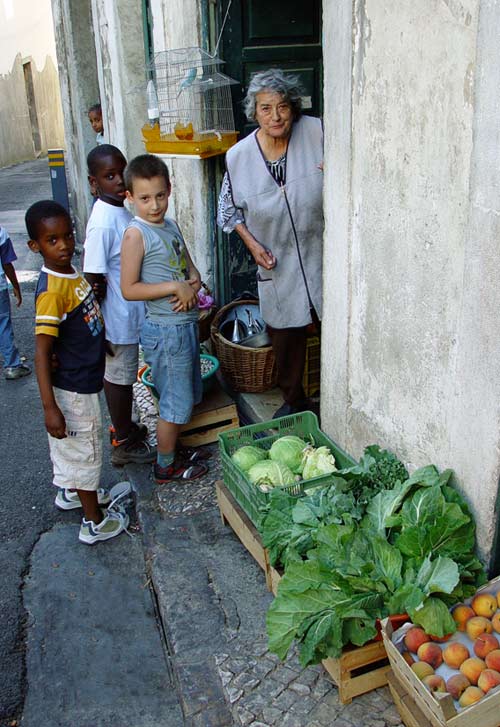
Ask me in October, and it’s São Jorge, one of the nine Azores Islands. It was there that my friend, Portuguese food scholar Janet Boileau, and I scoured the island in search of the finest sample of its namesake cheese: queijo São Jorge.
Ask me in March, and it’ll be the still-green undulating plains of the Alentejo, the great swath of land that cuts through the midsection of the country. In spring a riot of flowers speckle the landscape, almost in defiance of the sun that will pelt all of it into a tawny brown. The One and I spent three glorious weeks there, crawling on our bellies and eating, it seems, every living creature in sight.
But ask me at this time of year, and I always miss this woman. I have no idea what her name is. (I was too self-conscious about my Portuguese to speak to her.) She owned a sliver of a store in the Alfama district, just down the street from my apartment. Outside, she methodically lined the cobblestone sidewalk, which she swept daily, with a few crates of just-delivered greens (the best of which was couves, or kale), baskets of dented cookware, which I doubt anyone ever bought, and blemished fruit. Hung above was perhaps the loudest bird in captivity on the Iberian Peninsula.
What I miss most, though, was that every day when school let out, a gaggle of kids bottlenecked at her door. She’d wait until every last one was watching, and then she’d reach into the pocket of her smock for candy. As the kids ripped into the wrappers, she’d cackle, beaming behind her crooked, half-toothless grin. If I were walking by, she’d catch my eye and nod mischievously, knowingly. (Finally, one day she relented and tossed a candy my way: pineapple.)
Saudades. In Portuguese it means to miss something profoundly, to have a deep and unabidding longing. Today, eu tenho saudades de Portugal. I miss Portugal.

Tell us: Is there a place out there that you miss so much it makes you ache?












Descobri seu site somente hoje e adorei. Sempre virei visitá-lo. Parabéns.
Ver, muito obrigado. Por favor, volte sempre. Eu amo meus leitores portugueses. (E desculpe a minha Português. Eu uso o Google Translate muito.)
About 20 years ago, I spent a few weeks in the Alentejo. I remember the day the women of the village set out three long tables under the clear sky, heaped with casseroles and fresh fruit and desserts from their kitchens. They wore shirts and skirts in a riot of pattern and color, their hands were rough when they brushed against my shoulder, and their smiles, well, that’s what I’ll never forget. I’ve heard there have been too many changes to fathom in the Alentejo. I’m glad to hear you can still find those generous women, the ones who without fuss connect to others through casseroles, pineapple candies, and, most importantly, smiles.
What a lovely comment, Elizabeth. So few words, but so evocative. Yes, the Alentejo has changed a lot, but there still are those woman, hanging in there, hoping for a better day. It’s one of my favorite places in the whole country, especialy in early April, when the landscape wears a riot of color to rival the roupa, or clothes of the women.
Yyzlis, I missed your post earlier. Thank you for the reply. It brought tears to my eyes and gave me tingly cheeks (my equivalent of goosebumps, but I got those too 🙂
I can practically imagine bumping into your uncle at the fisherman’s market on the beach. Who knows! Maybe we even ate some of his catch! 🙂
I agree about the fabulous food. Everything is very simple, but beautifully fresh and beautifully prepared. It is sustaining and I long for such simplicity and nourishment. Even the bread is better…the cheeses, everything!
I could live there!